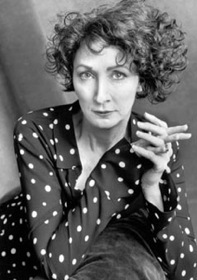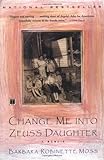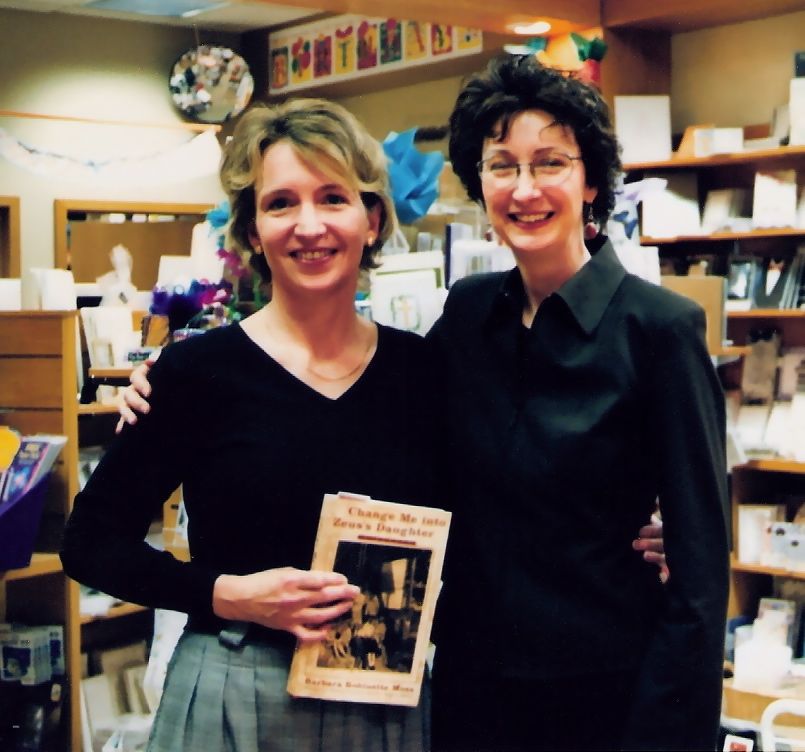A ‘fierce’ inheritance
A talk with artist and writer Barbara Robinette Moss
By Jody Ewing
10/21/04

Barbara Robinette Moss’s first memoir, “Change Me into Zeus’s Daughter,” took readers by surprise as she chronicled her family’s impoverished survival in Alabama’s red-clay hills. At times uproariously funny, at others horrific and tender, she wrote of growing up – the fourth in a family of eight children – with a wild-eyed alcoholic father and a humble yet heroic mother.
Unlike the rest of the family, Barbara bore the scars of abuse and neglect on the outside as well as the inside; the bones in her face grew abnormally due to childhood malnutrition and a complete lack of health and dental care.
She prayed nightly to be changed into the goddess of beauty’s daughter, and when her prayers went unanswered, took it upon herself to change not just her face but achieve a life defined by artistic beauty. Critics hailed “Zeus’s Daughter” as the masterpiece she had waited for her life to paint.
Moss marks two more milestones this week with the official publication of “Fierce: A Memoir” — her follow-up memoir to “Zeus’s Daughter” — on Oct. 19, as well as her first one-person art exhibition opening Oct. 21 at the Kerrigan Campbell Gallery in New York City’s East Village.

With warmth, insight and candor, Moss paints in “fierce” a vivid, moving portrait of her persistent quest to reinvent her life and rebel against the indigence, addiction, and broken-down dreams she inherited from her parents.
Moss tells the poignant story of leaving everything she knew in Alabama to fulfill her ambition to become an artist – an odyssey filled with gritty improvisation (taking her son Jason to her night job to sleep on the floor), bittersweet pragmatism (on a date filling her purse with shrimp, rolls and a doily to take home to her waiting 8-year-old), and staunch conviction and pride (chasing a mail carrier down the street to defend her use of food stamps).
In a phone interview from New York City – where Moss currently is studying playwriting at the Actors Studio Drama School – she talked about her writing and art, her family and “wrestling with angels.”
In online reviews of your books, readers have stated they feel like “voyeurs” of your family’s life and they still want more. Why your family? Why your books?
I think it’s because I didn’t hold anything back. I really told the truth and told things that were terrifying for me to tell, and I think that those are the kinds of things that overlap every family. Every family looks at it and says ‘Oh God, I can’t believe she said that. That’s going on in this family.’ And so it’s a universal story, even though when I first started writing I did not realize I was writing universal stories.
Tell me what “fierce” is about, and if one first needs to have read “Zeus’s Daughter.”
“Fierce” is the story of a single mother determined to change what she has inherited from living in poverty and with an alcoholic parent, and to also change the life or destiny of her child.

I wanted to give the reader everything they needed if they had not read ‘Change Me into Zeus’s Daughter,’ so this book stands on its own without having read anything about me.
Coming from such a large family, how did your siblings react to your first memoir?
When “Zeus’s Daughter” came out they were just horrified; they thought I was telling family secrets that I shouldn’t tell. And it took about a year for them to really realize that all of the terrible things they thought were going to happen because I had written this book actually worked in reverse. People came up to talk to them and said, ‘You know, my dad was an alcoholic, too,’ and they would pour their hearts out to them. And then they calmed down and reevaluated the writing and the purpose of the writing.
What is the danger, or is there a danger in keeping “family secrets?”
I think it’s more dangerous to “keep” family secrets than to “tell” family secrets. Everybody’s family has something they would rather the world didn’t know about, whether it’s an alcoholic or any number of things that can happen in family dynamics. But if you hold those in your heart, how do you get past them and live the fullest life that you can possibly live?
What is your relationship with your siblings like today?
It’s good. Most of them are still in Alabama within a few miles of where we grew up and I try to get home at least a couple of times a year. My brother John is in Kansas City and my sister Janet is in Charlotte. She teaches English and drama and is working on her degree to become a high school principal. She writes some, and John has written a couple of stories that he sent to me.
The legacy of your father’s alcoholism caught up with you and your brother Stewart – yours with an addition to emotional pain and abusive relationships, and Stewart’s addition to alcohol. How were you both successful in overcoming those additions?
I found a good counselor on a sliding scale, and that’s what I’d recommend to anyone. Find a good counselor. I was paying $5 and getting some real help. People don’t know what to do, and they have to have guidance. Stewart wrestled with an angel. There’s a story where he wrestles with an angel in “fierce.” He called me up a dozen times before he died and told me that story, and told me to write it for him. That’s how he got sober; he wrestled with an angel. And he did win. He was sober for two years before he died.
As an artist and a writer, what do these two professions have in common or how are they different?
I tell stories. That’s what I do. It doesn’t matter if I’m making art or if I’m writing, it’s the same thing. I have found that with art, I have a personal iconography, and it’s a lot easier to hide, really, from what you’re telling. People bring their own meaning to it. But with writing, it’s very much up front what you’ve got to say. There’s no hiding with the written word. I really had never intended to be a writer. I was following my own goals to be a visual artist when the writing came ‘in search of me.’
Will “fierce” appeal more to women than men?
I had a man who called me a couple days ago, and said his wife had read it and kept pestering him to read it. He reluctantly picked it up, read straight through and said he thought every man in America should read it. He was a recovering alcoholic and very interested in Stewart’s story. It’s definitely a book for anyone and everyone.
We’ll end with Stewart and “magic.” Tell me about the book’s prologue and the Mexican jumping beans.
What I wanted in that prologue was to set up this idea of magic, of the possibilities in life that things that seem to be completely unattainable are really right there, right there at your fingertips. I wanted these beans to have magic and they didn’t have magic. And then Stewart says, “Of course they have magic. This little bean has got a worm in it that’s going to eat that bean and turn into a butterfly. Don’t you think that’s magic?”
This article first appeared in the Weekender on Oct. 21, 2004.

Read Jody’s first interview with Barbara on the publication of “Change Me Into Zeus’s Daughter.”
Author’s Note: Barbara Robinette Moss passed away from cancer on October 9, 2009. She was 54 years old.
A Cedar Rapids Gazette article dated Oct. 14, 2009, said the former Iowa City author and artist would be remembered for the many lives she touched through her books, artwork and teaching.
She touched a great many lives — including mine — and is deeply missed.
Leave a Reply